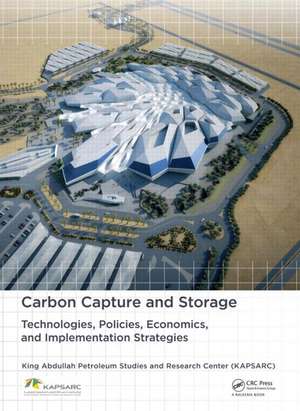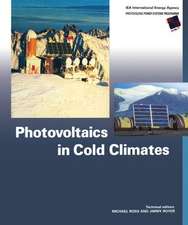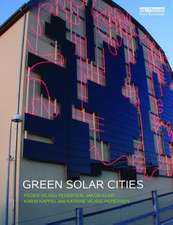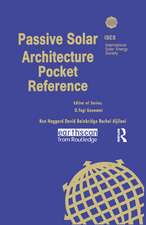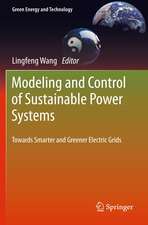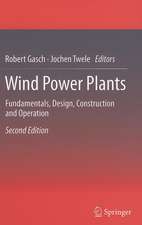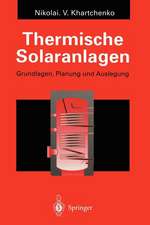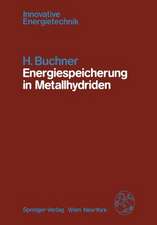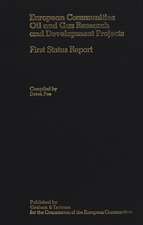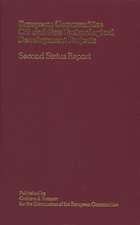Carbon Capture and Storage: Technologies, Policies, Economics, and Implementation Strategies
Autor King Abdullah Petroleum Studies, Saud M. Al-Fattah, Murad F. Barghouty, Bashir O. Dabbousien Limba Engleză Hardback – 2 noi 2011
The book is divided into three parts. The first part helps clarify the global context in which greenhouse gas (GHG) emissions can be analyzed, highlights the importance of fossil-fuel producing and consuming nations in positively driving clean fossil-fuel usage, and discusses the applicability of this technology on a global and regional level in a timely yet responsible manner. The second part provides a comprehensive overview of present and future technologies for the three elements of the CCS chain: CO2 capture, transport, and geological storage. The third part addresses the key drivers for CCS deployment worldwide. It provides analysis and assessment of the economic, regulatory, social, and environmental aspects associated with CCS development and deployment on a global scale. It offers a somewhat different perspective on CCS deployment by highlighting the environmental and socio-economic costs and benefits of CCS solutions compared to alternatives.
The book concludes with potential options and guidelines for sustainable and responsible CCS scale-up as a way to address prevailing global energy, environment, and climate concerns.
| Toate formatele și edițiile | Preț | Express |
|---|---|---|
| Paperback (1) | 427.84 lei 6-8 săpt. | |
| CRC Press – 16 aug 2018 | 427.84 lei 6-8 săpt. | |
| Hardback (1) | 1190.85 lei 6-8 săpt. | |
| CRC Press – 2 noi 2011 | 1190.85 lei 6-8 săpt. |
Preț: 1190.85 lei
Preț vechi: 1597.96 lei
-25% Nou
Puncte Express: 1786
Preț estimativ în valută:
227.87€ • 237.45$ • 188.67£
227.87€ • 237.45$ • 188.67£
Carte tipărită la comandă
Livrare economică 03-17 aprilie
Preluare comenzi: 021 569.72.76
Specificații
ISBN-13: 9780415620840
ISBN-10: 0415620848
Pagini: 404
Dimensiuni: 174 x 246 x 23 mm
Greutate: 0.96 kg
Ediția:New.
Editura: CRC Press
Colecția CRC Press
ISBN-10: 0415620848
Pagini: 404
Dimensiuni: 174 x 246 x 23 mm
Greutate: 0.96 kg
Ediția:New.
Editura: CRC Press
Colecția CRC Press
Public țintă
ProfessionalCuprins
Foreword
|Part I: Why CCS?
1 CCS in an global context
2 CCS deployment status, regional applicability, and stakeholders
Part II: Technical description and operability of the CCS chain
3 CO2 Capture and separation
4 CO2 Transport systems
5 CO2 Geological storage
Part III: Deployment drivers
6 CCS regulatory framework
7 Economics of the CCS chain
8 CCS quality standards – challenges to commercialization
9 Conclusion: A pragmatic way forward
|Part I: Why CCS?
1 CCS in an global context
2 CCS deployment status, regional applicability, and stakeholders
Part II: Technical description and operability of the CCS chain
3 CO2 Capture and separation
4 CO2 Transport systems
5 CO2 Geological storage
Part III: Deployment drivers
6 CCS regulatory framework
7 Economics of the CCS chain
8 CCS quality standards – challenges to commercialization
9 Conclusion: A pragmatic way forward
Notă biografică
Saud M. Al-Fattah is Director of Global Energy Markets and Economics Research at the King Abdullah Petroleum Studies and Research Center. Saud has more than 25 years of experience with Saudi Aramco working in several petroleum engineering departments including reservoir management, oil and gas reserves assessment and fields’ development studies, reservoir simulation and reservoir engineering systems. His areas of specialty include: reservoir management, energy markets and economics, artificial intelligence, and strategic management.
Saud has a U.S. patent, published several technical papers in peer-reviewed journals, and authored and co-authored three books: "Innovative Methods for Analyzing and Forecasting World Gas Supply," "Artificial Intelligence and Data Mining Applications in the E&P Industry," and "Carbon Capture and Storage: Technologies, Policies, Economics, and Implementation Strategies". He is an active member of the Society of Petroleum Engineers (SPE), the International Association for Energy Economics (IAEE), and the European Association of Geoscientists & Engineers (EAGE). He is also a member of the SPE Artificial Intelligence & Petroleum Analytics Subcommittee.
Saud is a technical editor for the SPE Reservoir Evaluation & Engineering Journal, Natural Gas Science and Engineering Journal, and several other industry publications. He held the positions of vice chairman of the 2006 SPE Saudi Arabia Annual Technical Symposium, and chairman of the 2007 SPE Saudi Arabia Annual Technical Symposium.
He earned his Ph.D. with distinction from Texas A&M University, and M.S. and B.S. degrees with honors from King Fahd University of Petroleum and Minerals (KFUPM), all in petroleum engineering.
Murad Barghouty is Director of Energy and Environmental Technology Research at the King Abdullah Petroleum Studies and Research Center (KAPSARC). He has 24 years of experience in Saudi Aramco encompassing assignments in reservoir management, reservoir simulation, reservoir characterization, and production operations.
Murad graduated in 1987 from Marietta College, Ohio, U.S., with a B.S. in Petroleum Engineering.
Bashir Dabbousi is the Interim Vice President of Research at the King Abdullah Petroleum Studies and Research Center (KAPSARC). Prior to joining KAPSARC, he was Coordinator of the R&D Division in the Research & Development Center, where he spent most of his career with Saudi Aramco.
He has coauthored 10 U.S. patents, 3 U.S. patent applications and 25 publications in peer reviewed technical journals in the research areas of nanostructured light emitting materials (5 patents licensed to two U.S. companies), liquid petroleum fuels, crude and products desulfurization and oil to hydrogen. During 2005-2006, he was an Academic Visitor in the Department of Chemical Engineering and Chemical Technology at Imperial College London.
Bashir received a B.S. degree in Chemistry summa cum laude from the University of California, Berkeley and a Ph.D. in Physical Chemistry from the Massachusetts Institute of Technology (MIT). He also completed the Advanced Management and Leadership Program at Oxford University, Saïd Business School.
Saud has a U.S. patent, published several technical papers in peer-reviewed journals, and authored and co-authored three books: "Innovative Methods for Analyzing and Forecasting World Gas Supply," "Artificial Intelligence and Data Mining Applications in the E&P Industry," and "Carbon Capture and Storage: Technologies, Policies, Economics, and Implementation Strategies". He is an active member of the Society of Petroleum Engineers (SPE), the International Association for Energy Economics (IAEE), and the European Association of Geoscientists & Engineers (EAGE). He is also a member of the SPE Artificial Intelligence & Petroleum Analytics Subcommittee.
Saud is a technical editor for the SPE Reservoir Evaluation & Engineering Journal, Natural Gas Science and Engineering Journal, and several other industry publications. He held the positions of vice chairman of the 2006 SPE Saudi Arabia Annual Technical Symposium, and chairman of the 2007 SPE Saudi Arabia Annual Technical Symposium.
He earned his Ph.D. with distinction from Texas A&M University, and M.S. and B.S. degrees with honors from King Fahd University of Petroleum and Minerals (KFUPM), all in petroleum engineering.
Murad Barghouty is Director of Energy and Environmental Technology Research at the King Abdullah Petroleum Studies and Research Center (KAPSARC). He has 24 years of experience in Saudi Aramco encompassing assignments in reservoir management, reservoir simulation, reservoir characterization, and production operations.
Murad graduated in 1987 from Marietta College, Ohio, U.S., with a B.S. in Petroleum Engineering.
Bashir Dabbousi is the Interim Vice President of Research at the King Abdullah Petroleum Studies and Research Center (KAPSARC). Prior to joining KAPSARC, he was Coordinator of the R&D Division in the Research & Development Center, where he spent most of his career with Saudi Aramco.
He has coauthored 10 U.S. patents, 3 U.S. patent applications and 25 publications in peer reviewed technical journals in the research areas of nanostructured light emitting materials (5 patents licensed to two U.S. companies), liquid petroleum fuels, crude and products desulfurization and oil to hydrogen. During 2005-2006, he was an Academic Visitor in the Department of Chemical Engineering and Chemical Technology at Imperial College London.
Bashir received a B.S. degree in Chemistry summa cum laude from the University of California, Berkeley and a Ph.D. in Physical Chemistry from the Massachusetts Institute of Technology (MIT). He also completed the Advanced Management and Leadership Program at Oxford University, Saïd Business School.
Descriere
The first book written on Carbon Capture and Storage (CCS) by a major oil-and-gas-producing country, this text provides a thorough overview of the current status of the various elements of the CCS chain and its technology, and how it could become a solution to reduce emissions. It also suggests some key guidelines to be adopted to deploy CCS in a sustainable manner. This book will be useful to a broad group of readers—specifically engineers, geoscientists, economists, and regulators. It will also be useful to high-level strategists and policy makers in energy-producing countries.
